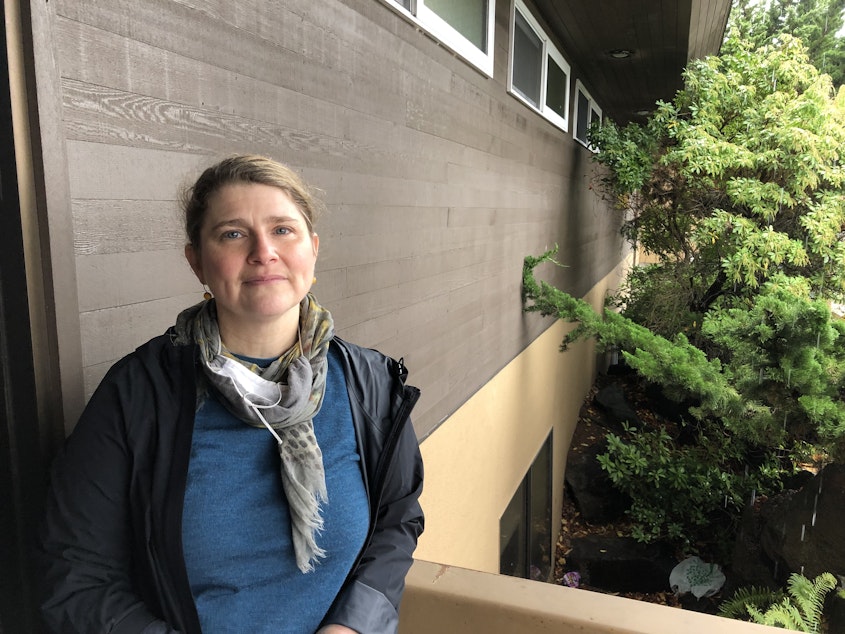Burien city council slate opposes low-income housing project

A new low-income housing project has become a flashpoint in municipal election in the city of Burien. Four city council races are on the ballot there. The races have pitted the project’s supporters against local business owners.
It would be the first project by the Downtown Emergency Service Center outside of Seattle: a six-story building with 95 units of permanent supportive housing for disabled and formerly homeless adults.
The Burien City Council approved the project last June, but the controversy continues. An anonymous flyer opposing it has recently shown up in local mailboxes.
Each of Burien’s four city council races has one candidate running who supports the project, and one who opposes it. Hugo Garcia and Martin Barrett are seeking Position 1, one of the council’s open seats. At a recent forum Garcia said he’s in favor of the project’s location, where a professional building currently stands in downtown Burien.
“Having our urban core be the center where folks get access to supportive, permanent housing — where they’re close to transit, health, food — makes a lot of sense,” Garcia said.
His opponent Martin Barrett disagreed.
Sponsored
“It should not be located in a prime area of development, surrounded by small business, retirement communities and families,” he said.
Barrett and other opponents also object to the project’s low-barrier model, where tenants have access to support services but may continue to use drugs or alcohol.

Robyn Desimone owns the Iris and Peony flower shop a few blocks away from the site. She said the housing project is just one example of a soured relationship between local businesses and the current city council. She’s hopeful that the City Council members opposing the project will win and be more responsive to business concerns.
“I’m excited to see some transparency come with the election and possibly the change in city council,” she said. “I have experienced some issues trying to get across some of the problems businesses have had, so I’m hoping some fresh blood will lead to some fresh ears.”
Sponsored
Desimone said she visited the Downtown Emergency Services Center site in Pioneer Square in Seattle and did not feel safe.
“It would be attracting the kinds of situations we are trying to avoid,” she said.
Desimone said business owners are already stressed about low-level crimes and a lack of police response. They fear the housing project will make things worse.
“We have gotten to the point of exhaustion where we’re not getting support and we’re not being helped, and we just have to put our head down and deal with it,” she said.
One question has been whether the project will serve people already dealing with homelessness in Burien, or whether residents will come from elsewhere. The DESC has committed to reserve 30% of the new units for local tenants. In a statement, DESC Executive Director Daniel Malone said “we expect to easily exceed” that minimum requirement.
Sponsored

Burien resident Zoe Bermet supports the housing project and believes opponents’ fears are overblown. She said she previously lived next to a similar type of housing project in Seattle, and had some questions at first, but she said, “once the construction was over, there was no impact on us. It was like living next to any other apartment building.”
Bermet said she thinks adding permanent supportive housing will actually help solve current issues around homelessness. But she said opponents aren’t acknowledging the complexity of helping people who are on the street.
“It feels like they just sort of want to build a moat around the city and like, everybody who’s homeless or experiencing any mental health or drug and alcohol issues, you keep on that side of the moat.”

Sponsored
The candidates opposing the project have refused to participate in most debates. Three refused to attend one held by the South Sound Chamber of Commerce. The League of Women Voters had to cancel an election forum due to their lack of participation, after LWV leaders said they made repeated attempts to contact them. The only event that included all eight candidates was convened by the local business association and provided the candidate questions in advance. They centered heavily on the DESC project.
Pastor Jenny Partch of the Highline United Methodist Church in Burien supports the housing project, but still said it’s a shame that one issue has gotten nearly all the attention in this election.
“It’s such a hot-button topic, that it doesn’t allow for other things that are just as important to be talked about. And people aren’t taking the time to get to know their candidates to know how they respond to all these other issues.”
The DESC expects to begin construction next spring, as part of some 500 housing units in the works around the region. Partch said her hope for when the project is completed is that “the people in this community would be volunteering in those places and getting to know the folks in one-to-one relationships who are in the process of getting healthier, living into their full capacity — and becoming a more gracious community.”




